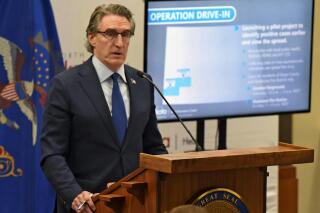Panel endorses changes to law that sets limits on spending

FILE - In this April 3, 2020 file photo, North Dakota Governor Doug Burgum, where he announced a pilot project to identify positive cases of COVID-19 earlier to slow the spread of Coronavirus in North Dakota. Burgum is pleading for citizens to get vaccinated against the coronavirus as North Dakota’s hospitals struggle to handle the influx of patients infected with the highly contagious delta variant. Burgum brought together health professionals from around the state Wednesday in his first COVID-19 briefing in more than five months. (Tom Stromme/The Bismarck Tribune via AP, file)
BISMARCK, N.D. (AP) — North Dakota lawmakers on Tuesday moved to significantly change the threshold on new legislation that limits spending of federal money by a governor-led panel.
The law, passed shortly before the Republican-led Legislature adjourned in April, came after the Emergency Commission, headed by GOP Gov. Doug Burgum, largely determined how to spend $1.2 billion in federal coronavirus relief the state received last year. Many lawmakers believed the full body should have that responsibility.
The Legislature easily overrode Burgum’s veto of the bill that he said “clearly violates the separation of powers doctrine” and would be unconstitutional.
The law, which got wide bipartisan support, caps the Emergency Commission’s spending authority of federal funds to $50 million and to just $5 million in so-called special funds in a two-year budget cycle, a cap that was quickly reached before the last budget cycle ended on June 30. Expenditures exceeding the cap need approval of the full Legislature later this year in a reconvened or special session.
The commission is comprised of the governor, the secretary of state, the chairmen of the state House and Senate appropriations committees, and the majority leaders of the House and Senate.
The Legislature’s interim Government Finance Committee recommended voted to raise the commission’s spending authority to 2% of the state’s general fund, which amounts to about $100 million at present. It also bumps spending authority of special funds to 1% of the general fund, or about $50 million in the current two-year budget cycle.
Spending that exceeds those thresholds would trigger a special session of the Legislature.
Fargo GOP Sen. Ron Sorvaag, a member of the interim committee, said the proposed change to the legislation is a “correction of something that isn’t workable.”
The Legislature, he said, “obviously didn’t get it right.”
The new law also allows a subset of the Legislature known as the Budget Section to alter decisions made by the Emergency Commission. That portion of the bill is not affected by the draft legislation. The 42-member panel comprises the House and Senate floor leaders and the members of appropriations committees, which are in charge of crafting state agency budgets.
The draft legislation will be forwarded to Republican-led Legislative Management committee, a 17-member panel of lawmakers that oversees business between sessions. That panel will decide in November if the amended legislation will go to the full Legislature, and if it would be considered during a special session, or during the next legislative session that begins in January 2023.
